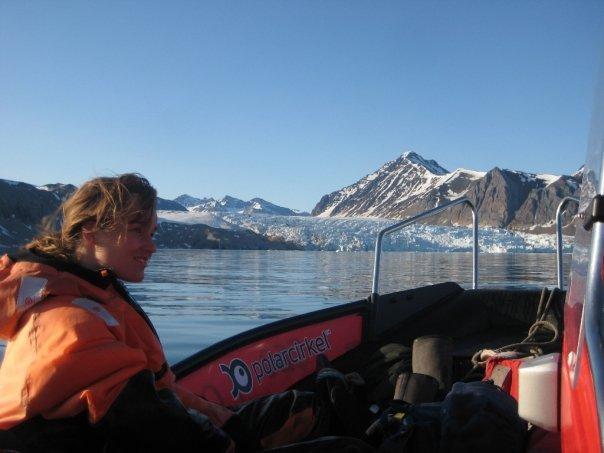Taking advantage of travel opportunities
Dutch master’s student, Elisabeth Machfeld Biersma, is one of 4 students in the Joint Nordic Master’s Programme in Marine Ecosystems and Climate (MARECLIM).

Main content
“It is a really interesting programme” explains Biersma, “it is too bad that only 4 students in my year have taken advantage of this opportunity”.
According to the programme web sites:
“The Joint Nordic Master's Programme in Marine Ecosystems and Climate is a two-year (120 ECTS) programme offered jointly by the Universities of Bergen, Iceland, Aarhus and the Faroe Islands. It's an international programme for students with a background in biological or physical oceanography, focusing on the skills and competences needed for addressing interdisciplinary marine problems.
The aim of the MARECLIM is to train [these] students … in the skills necessary for addressing complex interdisciplinary problems in marine science, and to prepare them for positions in society where such competence is needed.”
Biersma completed her undergraduate degree at the University of Groningen where she studied Marine Biology and Ecology. Her first travelling-to-learn experience was to Uppsala University via an Erasmus exchange. (Erasmus Programme (EuRopean Community Action Scheme for the Mobility of University Students) was established in 1987. Students who join the Erasmus Programme study do an internship for a period of at least 3 months to an academic year in another European country.) She decided to enrol in MARECLIM because she felt it would complement her previous studies with more oceanography and physics. She believes that it is important for researchers to have a broad understanding in highly inter-disciplinary areas such as Marine Science.
Biersma arrived in Bergen in August 2010. However, she did not spend much of the first year actually in Bergen, as the first year of the two-year programme involves course work at all four programme partner institutions. She feels that this master’s programme provides a great opportunity to both travel and learn. At the end of the first year she decided to undertake her master’s project in the field of genetics at CGB. Ida Steen is her supervisor, and many from Steen’s team, including Håkon Dahle, Runar Stokke, Irene Roalkvam and Frida Lise Daae, are serving as advisors.
She will be undertaking genomic studies of the sequences from samples from two different hydrothermal sites. The first is from microbial communities in bacterial mats at Loki’s Castle (summer 2008); the second from Jan Mayen (summer 2011). Sequences have already made from the Loki’s Castle sample, so the group have decided to ask for the sequencing to be done using another technique that will be based on longer fragments. This will provide more comparison opportunities between different sequencing methods; the traditional one generates relatively small DNA fragments. The sample material from Jan Mayen has not been sequenced before, Biersma explains, so nothing yet is known about the microbial community composition. Of course they expect to find sulphate reducers – but it will be interesting to see these results.
Biersma hopes to send the prepared samples for sequencing next week. When the results return she will be able to begin the genomics analyses under the tutelage of Dahl and Stokke. In addition she will begin work on trying to develop a new technique for RNA depletion. She explains that when RNA samples are generated they contain all types of RNA and actually for transcriptomics work – showing what type of activities cells are engaging in – only requires information about one type, messenger RNA (mRNA), which only makes up about 5% of most RNA samples. Such a technique would be extremely helpful for the on-going metagenomic studies at CGB.
Biersma says she really enjoys field work, and is interested in polar research. She has had the good fortune to be able to spend the last 3 summers working on Svalbard – two of them for the whole summer! She would definitely like to continue in this research direction in the future.
Joint Nordic Master’s Programme in Marine Ecosystems and Climate (MARECLIM)
At UiB: joint degree programmes / study programme details
On SIU’s web pages about Nordic Master Programme
The Netherlands Arctic Station on Svalbard

